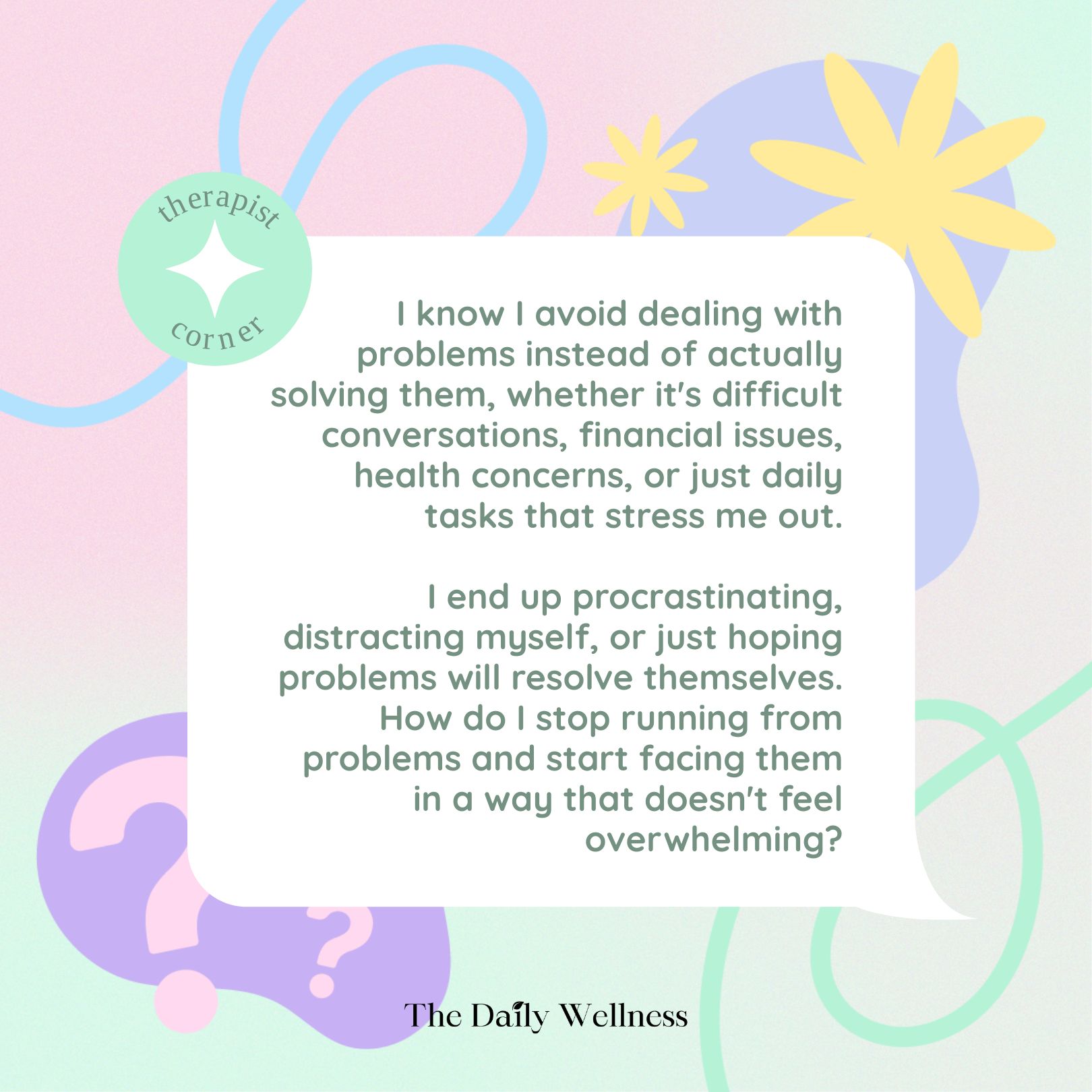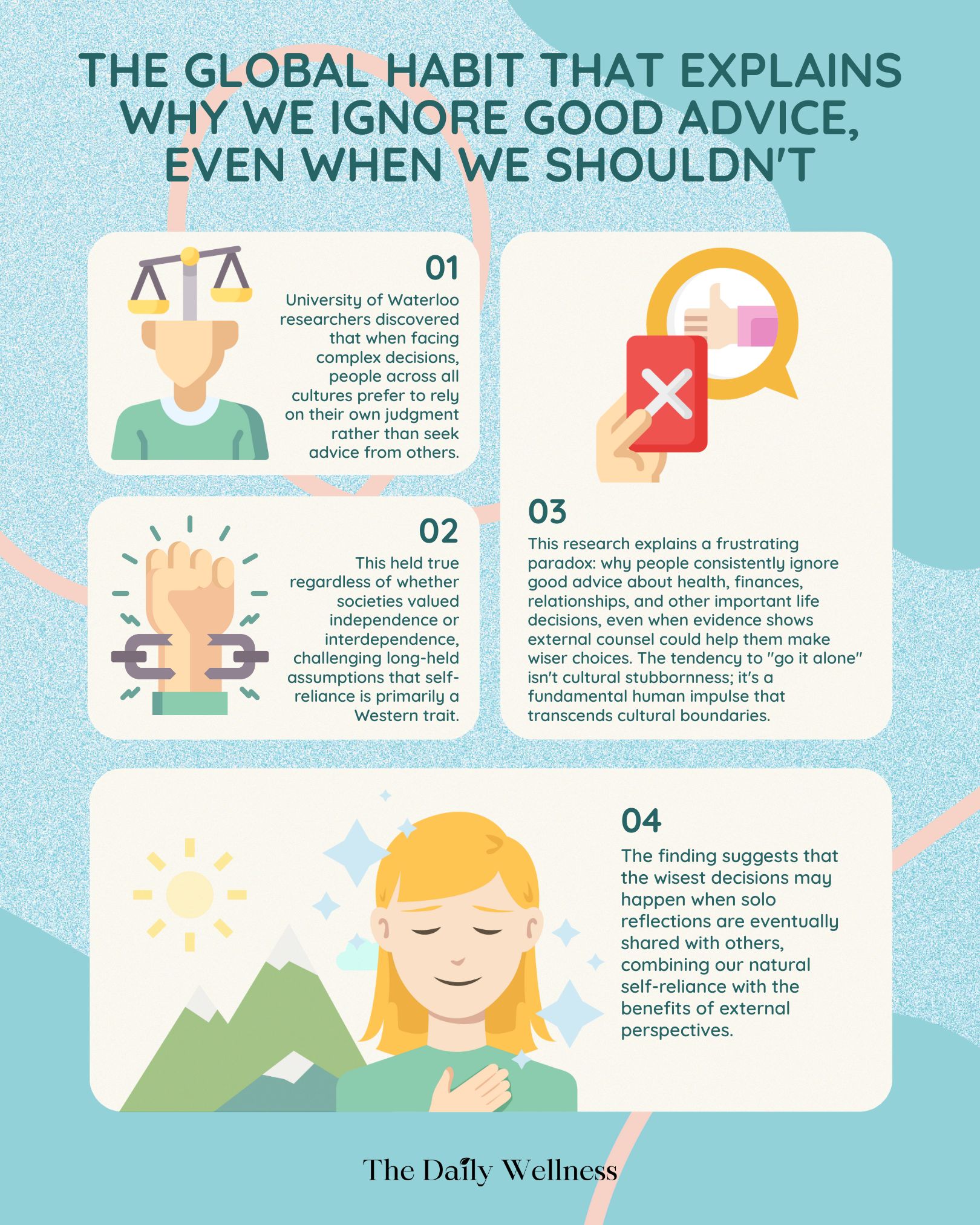If you tend to “go it alone” and second-guess your needs, this edition gives you space to trust your own mind first, then add the right kind of support.
Today’s Quick Overview:
🔬 Science Spotlight: The global habit that explains why we ignore good advice...
🗣 Therapist Corner: Why avoidance isn't a flaw but your nervous system trying to protect you...
📰 Mental Health News: Missed late-life autism; secondhand drinking harms students; young adults struggling most...
🫂Community Voices: From friendship-hopping to staying: relationships worth working through....

Let's take your internal temperature right now:
What’s your Friday temperature? Blazing with celebration, softly warm with a sense of completion, or cool and tired and ready to rest? Maybe it’s shifting hour by hour. Let that reading guide your handoff into the weekend: hot wants gathering and play, cool wants quiet and cocooning, warm wants simple, gentle joy.
QUICK POLL
Choose what sparks action for you. We’ll build around it.
When You Read Advice Here, What Makes You Most Likely to Try It?
FREE MENTAL HEALTH GIFT
Mental Health Habit Tracker

Discover a free, printable habit tracker designed to support your mental health in a gentle, structured way. Choose the practices that fit your season, check in each day, and use the notes space to notice what helps. The focus is steady progress, not perfection.
How to get it today: reply to this email with “Aug 29, 2025.” We’ll send your file within 24–30 hours.
THERAPIST CORNER

Turning Avoidance Behaviors Into Actual Problem-Solving Strategies
Avoidance isn’t a flaw; it’s your nervous system trying to spare you discomfort and uncertainty. That tiny wave of relief when you delay something teaches your brain, this works. Your brain is actually doing what it thinks is protecting you from discomfort, uncertainty, or potential failure.
Meanwhile, those unaddressed problems are taking up mental energy in the background, creating a constant low-level anxiety that makes everything feel harder.
What makes it feel heavier is the belief that it must be fixed perfectly and right now. When avoidance shows up, a few patterns are common: we imagine the task will be harder than we can handle, we tell ourselves it has to be flawless and finished in one go, or past obstacles and overwhelm have shaken our confidence.
Most problems look bigger in the head than in the hands. You don’t need more bravery; you need a smaller doorway. Give it ten quiet minutes. Gentle contact still counts.
Try This:
Name one thing you’re avoiding. Say it out loud in one sentence.
Set a timer for 10 minutes and work on one avoided task. When the timer goes off, you can stop
Write down exactly what you're afraid will happen if you address the problem, then ask if those fears are realistic
Break overwhelming problems into ridiculously small steps: "call insurance" becomes "find insurance phone number", and build on that.
Pocket reminder: Starting makes it smaller. You’re not finishing everything today; you’re showing your nervous system you can touch the thing and be okay.
SCIENCE SPOTLIGHT
The Global Habit That Explains Why We Ignore Good Advice, Even When We Shouldn't

What Researchers Saw: In a survey of 3,500+ people across 12 countries, from big cities to remote communities, researchers found a shared pattern: when decisions get complex, most of us prefer our own judgment over other people’s advice.
This held across cultures that prize independence and those that value interdependence. Intuition and private reflection consistently beat tips from friends or crowds.
Why it Matters: This helps explain a familiar paradox: smart, caring people still “go it alone” on health, money, and relationships. It isn’t stubbornness; it’s a human default.
If we work with that instinct instead of pushing against it, guidance lands better. For teams and relationships, that means giving space to think first, then sharing input.
A Wiser Blend: The strongest choices often come from private reflection first, shared perspectives second, combining self-trust with outside views.
Try it today:
If you’re deciding: Give yourself a brief solo window (e.g., 10 minutes) to outline options and what matters most. Then ask one trusted person for a single blind spot they notice.
If you’re advising: Start with questions that help them think (“What outcomes matter most to you?”). Offer your view as additional data, not a replacement for theirs.
Takeaway: People are more receptive to counsel after they’ve had room to hear their own mind. Design advice and self-talk around that rhythm.
MENTAL HEALTH NEWS
UK review: 90% of over-50s with autism may be undiagnosed or misdiagnosed. A new analysis urges better screening and tailored support for older autistic adults, citing links with poorer mental and physical health and higher suicide risk.
Secondhand drinking tied to students’ lower grades and worse mental health. A U.S. college survey links exposure to others’ alcohol misuse with poorer GPAs, lower satisfaction, and higher suicidal ideation; authors call for campus-level prevention.
Young adults now report the worst mental health worldwide, eclipsing the midlife “crisis”. A new PLOS ONE analysis indicates ill-being now peaks in the early 20s and declines with age, shifting support needs toward younger adults.
DAILY PRACTICE
Today’s Visualization Journey: Rooftop Movie Night Under August Stars

Settle onto soft blankets on a city rooftop. The August air is warm, a light breeze moving across the sky as the projector flickers to life. Popcorn in paper bags passes from hand to hand; someone pours iced tea.
As darkness settles, the film becomes background to what matters most: quiet company under a canopy of stars. A meteor streaks by. You feel the simple relief of ending a full week with connection and open sky.
Make It Yours: What simple gathering or connection are you ready to enjoy as this week winds down? How can you create space for the kind of unhurried togetherness that makes ordinary Friday evenings feel special?
Today’s Affirmations
"I can look back on this week with compassion for all the versions of myself I've been."
Some days you were patient; some, frayed. Some confident; some unsure. That range is not a flaw, it’s your humanity.
Try this: Name three different ways you showed up this week, then say: “All of that was me, and I appreciate each part.”
Gratitude Spotlight
Today's Invitation: "What's one way this week stretched you that you're actually glad happened?" Maybe you held more than you thought you could, discovered a new opinion, or adapted when plans changed.
Why It Matters: We often thank the wins and ignore the growth. Noticing the stretch reveals capacity you didn’t know you had.
Try This: Name one way you adapted and say, quietly, “I can handle more than I give myself credit for.” Let yourself feel grateful for that capacity.
WISDOM & CONTEXT
"I know people that believe in ghosts but don't believe in themselves." — Mitch Hedberg
Why it matters today: We’ll entertain wild long shots: lotteries, miracle comebacks, conspiracy theories, yet doubt our own next step. It’s easier to believe in the supernatural than in our capacity to learn, try, and grow.
Bring it into your day: Name one thing you keep shelving because it “probably won’t work.” Notice how generous you are with possibility when nothing is required of you.
Offer that same generosity to yourself. If you can believe in unseen things, you can believe in one human-scale action: a first email, a five-minute practice, a short, honest conversation.
COMMUNITY VOICES
"I Realized I Was Friendship-Hopping Like Job-Hopping"
-Shared by Jamie, 28
I didn’t see my pattern until someone reflected it back. Whenever a friendship got bumpy: canceled plans, an awkward disagreement, a distant phase, I drifted and poured energy into a new connection. I told myself I was just outgoing.
A coworker mentioned she’s had the same close friends since high school. “Don’t you get bored?” I asked. She laughed: “Jamie, you’ve mentioned like, seven ‘best friends’ in two years. Where did they all go?” I didn’t have a good answer. Some got “too needy,” some competitive, some messy. I just exited stage left when it stopped being easy.
I was treating friendships like jobs: the moment real work appeared, like conflict, care during hard seasons, uncomfortable talks, I started “interviewing” for replacements.
A few months later, my friend Kara and I had our first real fight. My reflex was to fade away like usual. Instead, I texted: “Hey, that got weird yesterday. Can we talk?” It was awkward. We got through it. And the friendship felt sturdier, like something we’d built, not just something we enjoyed.
Now I have fewer friends, but they can survive bad moods and complicated phases. Turns out the best friendships aren’t the ones without problems; they’re the ones worth solving problems for.
Share Your Story
Have a mental health journey you'd like to share with our community? Reply back to this email. All submissions are anonymized and edited for length with your approval before publication. Each published story receives a $10 donation to the mental health charity of your choice.
WEEKLY JOURNAL THEME
Your 3-Minute Writing Invitation: "What's one small experiment I tried this week with how I approach something, and what did I learn from trying it differently?"
Why Today's Prompt Matters: Friday is for noticing experiments, not just outcomes. Maybe you took a new route and saw more of your neighborhood, met a tense moment with curiosity instead of defense, or tried a fresh way to organize time. Small tries reveal what works better for you and build quiet confidence in your ability to adapt.
Make it easy: Write two lines: what you tried, and what you learned.
TODAY'S PERMISSION SLIP
Permission to Feel Good About Your Week Without Qualifying It
You are allowed to feel satisfied with how the week went without adding disclaimers about what you did not finish or what should improve next time. Satisfaction can sit alongside imperfection. Feeling good about effort does not erase your drive to grow.
If you need the reminder: You can be proud of this week, as it was, with its incomplete tasks and messy moments. Your satisfaction does not have to be earned by flawless execution. Sometimes the most helpful thing you can do is let ordinary effort count.

Tonight's Gentle Review
Invite the day to exhale by asking yourself:
What did this week show me about my ability to handle things I wasn't sure I could manage?
Where did I choose growth over comfort, even when it felt scary?
What do I want to appreciate about myself for persevering through another week of being human?
Release Ritual: Look at yourself in any reflective surface. Make eye contact with yourself and say quietly, "You did good this week." Let that acknowledgment settle in without rushing to add qualifiers or corrections.
THIS WEEK’S MEDIA RECOMMENDATION
Article: Getting Serious About Funny: Psychologists See Humor as a Character Strength
Read: Getting serious about funny: Psychologists see humor as a character strength by Janet M. Gibson
Psychology once sidelined humor; research now treats it as a real character strength: one that builds connection, buffers stress, and pairs with wisdom and emotional well-being.
Gibson describes how we “get” jokes in three quick steps: we form an expectation, notice a mismatch, and then resolve it by seeing the playful interpretation.
The piece also notes why complex humor can be trickier with age (working-memory load) yet often more satisfying when it lands, and how people who use humor in healthy ways tend to notice the good in their past, present, and future.
WANT TO CONTRIBUTE TO OUR NEWSLETTER?
Are you a therapist, psychologist, or mental health professional with something meaningful to share?
We're opening up space in our newsletter for expert voices from the field — and we'd love to hear from you.
Whether it’s a personal insight, a professional perspective, or a practical tip for everyday mental health, your voice could make a difference to thousands of readers.
👉 Click here to apply to contribute — it only takes 2 minutes.
MONDAY’S PREVIEW
Coming Monday: How to catch up on recognizing and communicating your emotions when your upbringing taught you that feelings were "too much" or unnecessary, and why "name it to tame it" can rewire your brain's emotional response.
MEET THE TEAM
Love what you read? Share this newsletter with someone who might benefit. Your recommendation helps our community grow.
*The Daily Wellness shares educational content only and is not a substitute for professional medical or mental health advice and diagnosis. Please consult a licensed provider for personalized care.